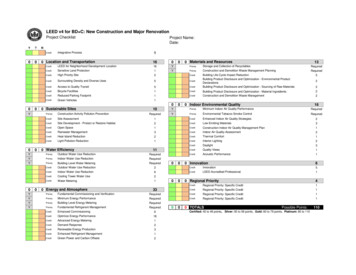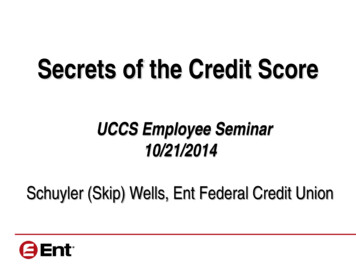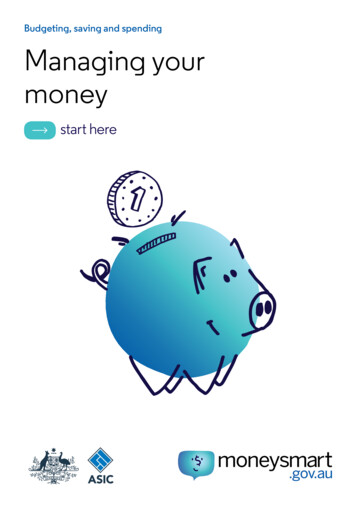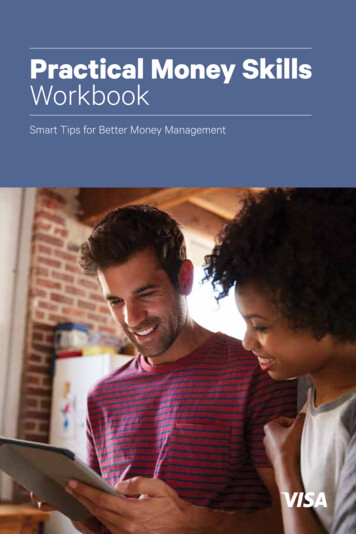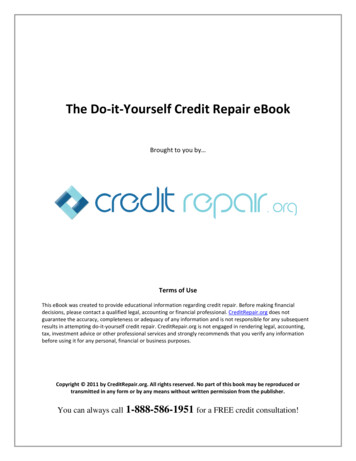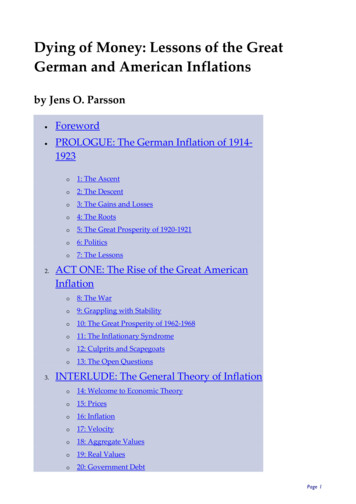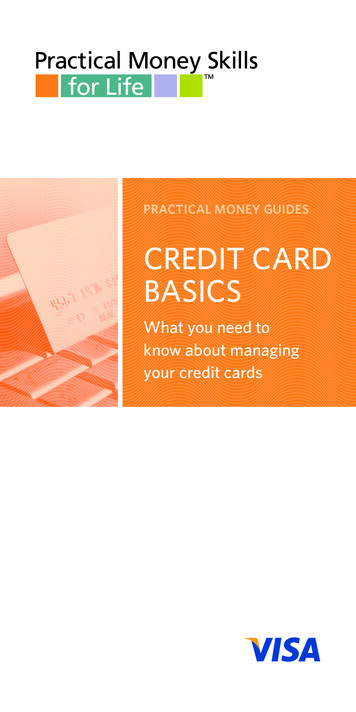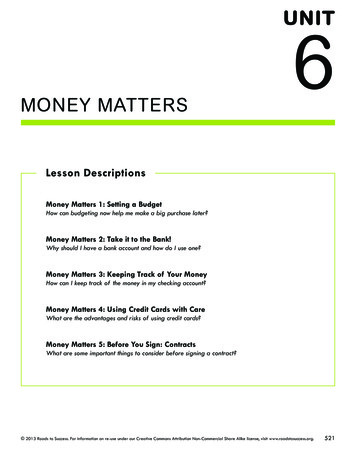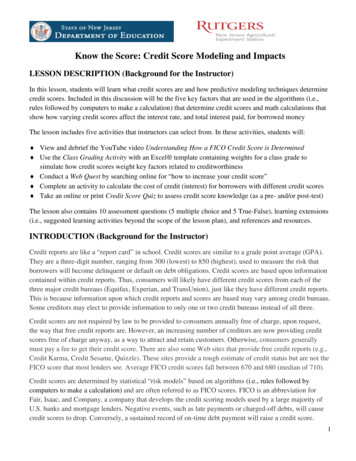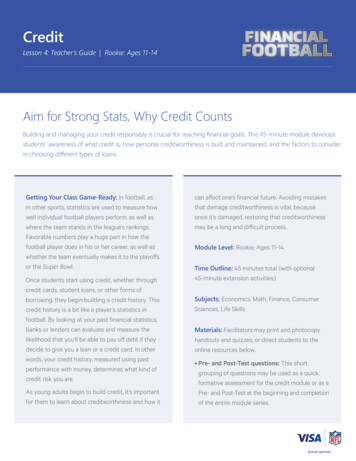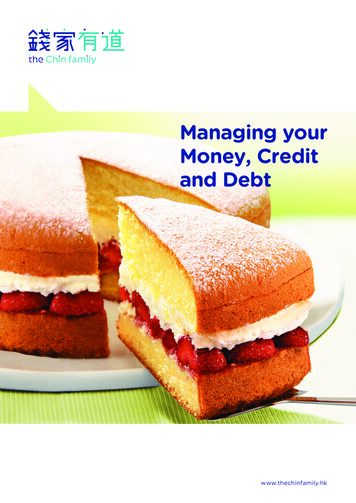
Transcription
Managing yourMoney, Creditand Debtwww.thechinfamily.hk
About The Chin FamilyThe Chin Family is an independent and impartial financial education platformproviding free information, resources and programmes. We help people inHong Kong plan and manage their finances by making financial learning simpleand enjoyable. The Chin Family is managed by the Investor Education Centre,which is supported by the Education Bureau and all four financial regulators.
ContentsWhat Is Money Management?2Setting Up A Budget4How to create a budget6Spend less than you earn8Money-saving tips9Saving For The Future12Start saving early13Making it easy to save14Where to save15Review your spending and saving15Staying On Top Of Credit17Types of credit and loans18Credit scores, reports and consequences20Responsible borrowing21Managing Your Debts24Keeping track of debt repayment26Tackling debt trouble28Consolidating debts29Bankruptcy30Know your rights when dealing with debt collectors311
What Is Money Management?Making ends meet andmanaging daily financesMoney management is key to sound financial planning andis an important life skill for everyone. Such skill allows youto stay on top of financial situation, keep track of spendingand achieve financial goals more effectively. The benefits ofdeveloping good money management from an early agecan be enormous in the long term.2
Take charge of your moneySettingSavingStayingManagingup abudgeton top ofcreditfor thefutureyourdebtsReady?Let’s get started!3
Setting Up A BudgetUnderstand where yourmoney is going in and outBudgeting involves making a list of all your expenses,and comparing it against your total income. A budgettells you exactly how much you are spending everymonth – and what you are spending it on. An accuratepicture of your inflows and outflows will help you identifywhere you can make savings or cut back on everydayexpenditure which you can then put towards meetingyour longer term financial goals.4
BudgetingList your income and expensesIncomeExpenses salary pensions outstanding balanceof credit cards savings andinvestments personal loans mortgage repayment other income,etc. taxation education planning forretirement, etc.BudgetPlannerThis budget planner can help you record all of your incomings andoutgoings, and give you a breakdown of where your spending goeseach week, month or year across the following broad categories:household, transport, food and drinks, leisure, shopping, health andbeauty, education and profession, family and friends, taxation,financial commitments, etc.You can save your budget planner results on your computer, print itout for later reference or work offline by downloading the budgetingspreadsheet onto your computer.You can access the Budget Planner at:www.thechinfamily.hkTools &ResourcesCalculators5
How to create a budgetYou can create your budget easily by using online tools like theBudget Planner, or by using the budget planner worksheet on thenext page. Before using the planner, be sure to:STEP1STEP2STEP3STEP4STEP56Collect your financial statementsThese include bank statements, investmentaccounts, receipts and any other information onincome sources and expenses.Make a list of your total monthly incomeYour income includes your salary, income fromself-employment or investments, and anyother sources.Itemise your actual expensesYou can do this by doing a spending diary. Do notforget to include your one-off expenses such asgifts, insurance policies and your taxes! For annualor other non-monthly payments, divide the totalannual amount by 52 or 12 to determine how muchto set aside every week or month.Carve out investments from your fundsfor discretionary spendingInvestments such as financial productsand property are also cash outfloweven though they are your assets(value may go up or down).Create a budgetEnter your figures into thebudget planner worksheet.
What’s your budget?Use this worksheet to work out your own budget:IncomeSalarySpouse’s salaryOther incomeSubtotal:Savings and ageHKDManagement feeHKDUtilities(water, electricity, gas) HKDInternet/Telephone/Mobile phone service HKDPay TVHKDOthersHKDTransportHKDFood and drinksHKDGrocery shoppingHKDEating outHKDOthersHKDFamily and friendsHKDSupport for parentsand relativesHKDChildrenHKDOthersHKDFinancial commitmentsInsuranceHKDLoan repaymentHKDCharity donationsHKDOthersHKDSavings/InvestmentsRetirement schemesHKDHKDSubtotal: HKDLifestyle/LeisureMoviesMusicInterest class/HobbiesOthersShoppingHealth and beautyMedical/Dental careHealth supplementsFitness and beautyCosmetics andskincareOthersEducation andprofessionPlanning for ageingFinancial andlegal HKDHKDHKDHKDIncome – Savings – Expenses HKD* You can save up for your annual tax bill by estimating your taxes for the year, then divide that figureby 12 to calculate how much to set aside every month.7
Spend less than you earnAdhering to this principle can helpyou avoid taking on unnecessarydebt while building your savingsand funds for investment.Prioritise your needs and wantsand look for any unnecessaryexpenses you can cut to savemoney. Go through your bills andcancel any services you do not use.Also, see where you could cut backon non-essential items likeentertainment, dining out andshopping, memberships, etc.Paying for your purchases in cash is one way to improve your financialdiscipline. It can help you avoid credit card debt.Life is unpredictable, so it should be a top priority to maintain an emergencyfund. As a guideline, having six months of expenses saved up can help youavoid taking out a loan in case of a medical or financial emergency.You can live within your means and still enjoy life. The general rule of thumbshould be to reduce spending on optional extras, but not to entirely excludeall those little enjoyments in life.8
100Money-saving tipsAvoid impulse buysStick to the items on your shopping list when you visita store.Delay purchases100Found something ‘have’ to buy? Wait for a day or twobefore deciding, you may not need it after all.100SubstituteIf the item you want does not fit your budget, considerbuying a similar, but less expensive item.CompareShop around to compare prices at different retail outlets,online and offline, you may find the same item or serviceat a lower price.Set rulesThink about the limited storage space at home and setsome rules for shopping. For example, set a limit forbirthday and festive presents.ReduceReview everyday expenses to cut back on non-essential items.Cut-backCalculatorWant to find out where you can cut back on your non-essentialspending? The Cut-back Calculator can help you identify areas whereyou can save on your expenses.You can access the Cut-back Calculator at:www.thechinfamily.hkTools &ResourcesCalculators9
BankingonlineInternet banking can be a convenient and flexible way to manageyour money. While enjoying the ease of internet banking, there areimportant things to remember to protect yourself when bankingonline:100 Never disclose your personal logon and security details such asaccount number, PIN and security code to anyone including bankstaff and the police.100 Avoid accessing your bank account with public computers(eg cyber cafes) and close all browser windows before loggingon to internet banking.100 Monitor and report any unauthorised and unusual transactions inyour statement and contact your bank immediately if you suspectthat you have been a victim of online fraud. Never respond to any unsolicited email that asks you to validateyour logon or account details. Never use hyperlinks in emails or internet search engines to log onto internet banking. Always disconnect from the internet when not using it. Install reputable anti-virus or security protection programme onyour computer. Always shred confidential/personal information before disposing.10
Money mattersStudentsBeing a student can be expensive – from tuition fee to textbooksand learning tools, there are many costs associated with studying.Good money management is essential to ensure you are on top ofyour expenses to cope with rising education costs.Financial prioritiesYour number one priority should be saving money for education.Do not justify overspending based on your future earnings – a solidfinancial footing should start from young!Keys to managing personal financesCreate a budget to understand your spending habits and setlimits on what to spend. Make an effort to set aside some moneyfor savings. Differentiate your needs from your wants and prioritise yourspending accordingly. Use credit cards responsibly. Always try to settle your bills in fullevery month. Do not borrow more than you can afford to repay. Make good use of financial assistance for students. Student loansoften offer better interest rates and longer repayment terms. Make your payments on time everymonth will help you pay downyour debt and maintain yourcredit score. Be aware that a negative creditscore can carry significantbearings. Banks and otherlenders may impose higherinterest rates or decline yourapplication for mortgages,personal loans or even creditcards in future.11
Saving For The FutureSet clear and realisticfinancial goalsSetting financial goals, whether large or small, short- or long-term, can bemotivating and give you something to aim for. Your goals may change atdifferent stages in your life. Whatever your age or circumstances, it is goodpractice to work out your goals and start saving as early as you can.Once you have created your budget, you can easily see if you are spendingmore or less than you earn. If you are spending more, use the Cut-backCalculator to identify areas to cut back. If you have surplus funds, you canuse this money to save or invest.Set yourself some clear and realistic financial goals – you will find it easier tosave money when you know why you are saving.Whatever goals you have set, review your progress regularly and mark thereview date in your diary. And when you have achieved one goal, set anotherto keep up the motivation for regular saving.12
Start saving earlyThe earlier you start saving, the sooner you will allow yourself to benefit fromcompounding, a powerful mechanism that puts time to work on your savings.When you save or invest in something that pays interest, you earn interest onyour principal (the original investment amount). If you continue to save andearn interest, you will receive interest on the principal plus the interest youearned last time – earning interest on your interest. This is called compoundinterest, and it can significantly boost your savings over time.Case studySaving early to let your money growVivian and Thomas were classmates at university. At age 25, Vivianstarted putting HKD1,000 into a savings account every month at anannual compound interest rate of 2.5%. When she turned 45, her savingsgrew to HKD310,978. But Thomas waited until he was 35 to start savingHKD2,000 every month at the same interest rate. By the time he reached45, his savings totalled HKD272,344.Even though the total amount of principal they put in over the years wasthe same ie HKD240,000, Thomas could only earn HKD32,344 in interestwhile Vivian gave her money more time to grow and earned a total ofHKD70,978, which was more than double of what Thomas 0050,000Vivian253035Thomas4045Age13
Making it easy to saveKeep a separate savings accountYou may find it easier to save if you keep a separate savings account fromyour regular transaction account. Consider transferring a fixed amount ofmoney from the account you receive your regular income at the beginning ofeach month and put it into the separate savings account. You can alsoconsider joining a savings plan offered by banks that automatically deductcontributions from your account each month.Break large savings goals into smaller onesIt may be helpful to break your larger savings goals such as buying a houseand planning for retirement into some smaller goals such as paying foreducation or going on vacation to help you get there. Set yourself some clearand realistic saving goals – you will find it easier to save money when youknow why you are saving.Reward yourselfAllow yourself some little self-rewards for achieving each small goal, and tellyourself along the way that every dollar you save is bringing you closer tosomething that is important to you.14
Where to saveIn general, you should consider putting your emergency fund and short-termsavings in safe investments that earn interest, such as a bank savings accountor term deposit. This will give better peace of mind that capital will beavailable any time you need it.As a depositor, be it personal or corporate, you are entitled to becompensated up to a maximum of HKD500,000 according to the DepositProtection Scheme. The Scheme was introduced to pay depositorscompensation in the event of the failure of a bank which is a memberof the Scheme.Long-term savings should generally include investments that offer higherreturns such as stocks or funds. These can grow your savings faster, but thereis also a higher risk you may lose money and you need to do a thorough riskassessment to determine the kind of investment instruments that suit yourneeds and circumstances.Review your spending and savingReview your spending and saving on a regular basis, and makeadjustments when your resources, needs and situations change.Savings GoalCalculatorSaving up for something special? Getting married? Buying a home?Furthering your education? The Savings Goal Calculator can help youwork out how you can achieve your savings goals. It will help youcalculate how much you will need to save regularly to reach your goal intime; how much you will have if you put aside a fixed amount of moneyregularly; and how long it will take to achieve your savings target.You can access the Savings Goal Calculator at:www.thechinfamily.hkTools &ResourcesCalculators15
Money mattersParentsManaging personal finance is already not easy, not to mentionproviding for the children and planning for the family’s future.Parents certainly face a unique set of financial issues and challenges.Financial prioritiesApart from making ends meet for the family and building up educationfund for your children, it is important that you equip your children withthe necessary financial knowledge and capability to make soundfinancial decisions.Keys to raising money-smart children Lead by example – you are your children’s most important rolemodel. Show them good money habits. Talk to your children about how money works, for example showthem how to read household bills and bank statements. Do not splash on your kids. Create a culture of saving and wise spending at home. Teach your children how to budget. Encourage them to setspecific and realisticlong-term goals and tosave regularly towardstheir goals.16
Staying On Top Of CreditUse credit wisely andresponsiblyCredit encompasses any form of deferred paymentand is an effective tool to help achieve yourfinancial goals if used properly.Make sure you stay on top of yourcredit, understand the nitty-gritty ofyour loans, lenders, terms, interestrate, repayment period, other feesand charges. This will help youenjoy the convenience of creditproducts while allowing you tocatch problems early and keepingyour personal finance in control.17
Types of credit and loansBorrowing may be a convenient way to purchase something that you wouldotherwise take a long time to save up for. When it comes to obtaining a loan,you have plenty of choices. Some of the most common types of credit andloans are:Credit cardsCredit cards let you pay for items in stores, restaurants andonline, you can also use credit cards to withdraw cash fromATMs. They are accepted at many outlets worldwide, which is aconvenient form of payment, but credit cards should be usedwisely, as they tend to have higher interest rates than consumerloans or other lines of credit.Watch out for100 Late repayment charge if your monthly repayment is overdue Interest charged for partial or minimum repayment Relatively high interest charged for cash advances100Overdrafts100If you withdraw more funds than you have in your account,your account is considered overdrawn. You may be chargedan overdraft fee, and also have to pay interest for the amountoverdrawn.Watch out for Annual fees for overdraft facilities100 Overdraft handling charges if your account becomesoverdrawn Interest is calculated daily on most overdraft facilities Extra fees for overdrafts beyond your agreed credit limit18
100Personal and tax loansPersonal loans can give you access to funds for a variety ofpurposes. Typical personal loans require you to repay regularinstallments over a set period of time.100A tax loan is a specific type of personal loan, usually offeredaround the time Inland Revenue taxes are due. Designed to helpconsumers ease the burden of paying their tax bills, these typesof loans may offer lower interest rates compared to normalpersonal loans.Watch out for Handling fees charged for processing a loan Early repayment charge if you pay off a loan earlier than theagreed term Late repayment charge if your monthly repayment is overdue100 Cancellation fee if you change your mind and cancel the loanafter you have signed the contract100Mortgage loansFor most people, buying a home means taking out a mortgage.When you take out a mortgage, you are borrowing money topay for a home by using it as collateral. So if you fail to keep upthe repayments on the mortgage, you risk your home beingrepossessed.Watch out for Fees for professional appraisers to determine the valueof collateral property Legal fees paid to lawyers for processing a mortgage Stamp duty to the government to register a mortgage Premiums paid to insurers for fire or other damage coverageof a property19
Credit scores, reports and consequencesIf you have applied for a credit card, mortgage or personal loan, your lenderhas probably reviewed your credit report as part of the approval process.Your credit report contains a credit score, which is a numerical snapshot ofyour credit report at a particular point in time. If your credit history showsyou have a solid bill payment history and low non-mortgage debt, your creditscore will give lenders confidence when approving your loan application.If you do not pay your bills on time, or have excessive debts, these factorswill be recorded in your credit report. If you have a poor credit history,banks and other lenders may impose higher interest rates or decline yourcredit application.20
Responsible borrowingBefore you decide to borrow money, it is worth taking the time to askyourself a couple of key questions, and to make sure you can afford newdebt repayments on top of your current expenses or commitments.What are youborrowingmoney forTaking out a loan to pay for a home or aneducation makes sense in many cases, butborrowing for vacations or other discretionaryitems may not be necessary. Too much debtcan be a long-term burden.Is borrowingyour bestoptionBorrowing may not always be the best option.There may be other ways to achieve yourgoals without going into debt. For example,you might be able to meet your goals bysaving instead of borrowing.How muchshould youborrowWhat is the costof borrowingmoneyAvoid borrowing more than you cancomfortably repay. Before you borrow, askyourself if you will be able to make thepayments – and remember to take interestcharges into account as well. It is usuallya good idea to ask your lender fora repayment schedule and a detailedbreakdown on the total cost of the loan.When you borrow money, you have to repaythe principle (the amount borrowed) plusinterest. If you choose a floating-rate loan, bemindful that your repayments will rise and fallin line with market interest rates. Be awarethat some financial institutions may chargeother fees as well.21
Consider the following before you borrowMake a budget to work out your monthly spending, savings andborrowings and check how much you can afford repaymentsAllow for expenses for unexpected events(eg losing your job, floating rate loans and emergencies)Only borrow what you need and what you can comfortably repay.Do not be tempted to borrow more even if you qualify for abigger amountShop around for the best deal on interest rates and watch out forany extra chargesChoose the right type of loan that meets your needsMake your payments on time to avoid penalties and pay off yourdebt quickly to minimise total interest paymentsAvoid unnecessary multiple sources of credit to keep an easy trackof repaymentsGuarantees andsuretiesIf the lender is unsure about your ability to repay the loan, they can askfor a surety or guarantee. A surety is a legally binding agreement that athird-party (usually a person or a company) accepts responsibility forthe loan if you cannot make your payments. This third party is knownas a surety or guarantor.100If you fall behind on the payments, the lender has the right to demandthat the surety either make up the missing payments or repay the loanin full. If the surety fails to meet the obligation, the lender has the rightto take legal action against the surety.10010022
Money mattersSetting up a homeSetting up a home involves many financial considerations and shouldbe planned carefully. Depending on your finances and lifestyle, youhave the choice of buying a home or renting one. Some keyconsiderations are:Buying a home Work out how much down payment and monthly installment ofmortgage plan you can afford. Make sure it is a comfortable level foryou and your family. In addition to mortgage payments, remember there are propertytaxes, insurance, and utilities fees to pay. Be aware of the financial obligations of regular home maintenanceand repairs, the costs of which can add up over the years. Consider factors such as job security. A mortgage is a long-termfinancial commitment.Renting a home Renting is not just about paying a monthly rent. There are other costssuch as rental deposit, legal costs for preparing the lease agreement,insurance of your contents, etc. Take into account the moving expenses –your landlord may not renew the tenancyagreement with you at the end of thecontract and you may have to movehome every few years. Pay attention to the terms ofyour tenancy agreement,especially regarding:– Rates– Management fees– Subletting– Maintenance and repairs23
Managing Your DebtsMake payments on timeand avoid over-borrowingWhatever amount of money you owe, managing your debtseffectively is important. Even if you just owe a little, alwaysmake payments on time to keep your debt under control. Additional interestor penalty charges can add up quickly if you get behind on repayments.Debt can be a growing problem if not managed properly. Borrowing too muchcan lead to financial strain, mental stress and even bankruptcy. Always becareful to avoid taking on too much debt and avoid multiple sources of credit.Pay special attention when it comes to your mortgage, which is usually thebiggest loan you will take out from your bank. Avoid the temptation of takingout a mortgage with payments larger than you can comfortably meet. Witha more affordable mortgage, it will be easier to make monthly mortgagepayments without putting your finance under strain, and in some casesyou may even be able to make extra payments to pay off the mortgagemore quickly.24
Case studyManaging credit card repaymentCredit cards usually carry higher interest rate amongst all consumerloans, meaning your debts can add up very quickly – especially if youonly make the minimum payment. Minimum payment is generallycalculated as a percentage of the outstanding balance (usually 1%) plusinterest and other fees and charges, or it can be a fixed minimumrepayment amount (eg HKD50), whichever is higher.If for some reasons you cannot settle a credit card bill in full, it is alwayswise to make a partial payment with as much as you can afford ratherthan the minimum payment.To illustrate as an example, assume that you have a credit card balanceof HKD10,000 and the annualised percentage rate (APR – which givesyou the total cost of the loan per year by factoring in all the standardcosts associated with the loan) is 30%, calculated monthly. You havetwo payment options:A: Make the minimum paymentB: Make a partial payment with a fixed amount of HKD800 each monthAssuming no new spending, annual fee and other charges, the tablebelow shows how long it will take you to pay off the debt and howmuch interest you will pay using each of the two payment options:Borrowed HKD10,000at 30% APROption A –Option B – FixedTime to pay off19 years and 11 months1 year and 3 monthsOriginal balanceHKD10,000HKD10,000Interest to be paidHKD19,772HKD1,834Total amount to be paidHKD29,772HKD11,834Amount saved comparedto minimum payment–HKD17,938Time saved comparedto minimum payment–18 years and8 monthsMinimum paymentpayment of HKD800The above example which shows the calculation of minimum and fixed payment is for educationalpurpose only. The minimum payment is based on 1% of the outstanding balance plus monthlyinterest. Please note that the annualised percentage rate and the calculation of payment amountand schedule vary among different card issuers and that the figures should not serve as the solereference on actual credit card payment. For exact credit card payment, please refer to relevantdocument(s) or statement(s) provided by respective card issuers.25
Keeping track of debt repaymentMaintaining your financial health is like keeping in good physical shape –both require careful planning, personal discipline and good habits.Create a budgetWork out a budget that accounts for future loan repayments and expenses.A budget will give you a clear picture of where your money is going, and howto manage your loan repayments most effectively.Allow for interest rate changesLeave some room in your budget to allow for changing rates. If interest ratesrise, your loan repayments may rise with them.Do not borrow more than you can afford to repayAs a rule, keep your loan payments on mortgages, credit cards and any otherdebts to a level you can comfortably repay.Pay your bills on time every monthIf you can avoid it, never miss a payment – it may affect your credit score.Carry credit card balances responsiblyAlthough you can avoid interest charges if you pay off your credit card billevery month, there may be times when you have to leave a balance. If thishappens, paying off your balance as quickly as possible can help keep interestpayments to a minimum.26
Signs you may be experiencing debt problemsYou consistently run up charges to your credit card limitYou use your credit cards as a necessity instead of a convenienceYou regularly borrow money to make it from one pay chequeto the nextYou are only able to pay interest or service charges every month,and have trouble reducing your total debtYour creditors contact you for payment, threaten to sue orrepossess your collateral, or hire a collection agency to recover themoney for themDebtCalculatorShould you be worried about how much you have owed? The DebtCalculator gives you an overview of all your personal debts, includingcredit cards, personal loans and other loans (eg relatives and friends).It also provides you with options and tips to help you manage yourdebts effectively.You can access the Debt Calculator at:www.thechinfamily.hkTools &ResourcesCalculators27
Tackling debt troubleIf you are having trouble making your loan repayments – or youforesee having trouble soon – it is important to take action rightaway. Debt problems can grow quickly if on528Review your budgetAre there any non-essential expenditures you can cut ordelay to help pay off your debts?Pay off your debt as much as you can each monthAt least pay the minimum you owe on each loan as thiswill protect your credit score. If you can afford to paymore, allocate payments towards the loan with thehighest interest rate first.Repay secured debts firstPrioritise secured debts like your mortgage overongoing payments on unsecured debts like creditcards, so you don’t risk your home being repossessed.Tell your lender that you are experiencingfinancial difficultyIn many cases, lenders may be willing to examine yoursituation and work with you to help resolve the problem.For example, you may be able to extend the term of aloan or arrange to postpone repayments for atemporary period.Consolidate your loansConsider consolidating your loans, lines of credit andcredit card balances into a single loan with a setrepayment schedule. By consolidating loans, you may beable to save on interest charges and manage your debtswith one single payment.
Consolidating debtsIf you are struggling with many debts that are no longer manageable throughsimple regular repayments, you may consider consolidating your debts suchas loans, lines of credit and credit card balances into a single loan.Consolidating your debts may provide a lower overall interest rate and thussave on your interest costs. This is particularly true if you consolidate youroutstanding credit card balances into a loan at lower interest rate. You mayalso be able to extend your repayment period, making your monthlypayments smaller. Debt consolidation can also help simplify your financesby giving you just one monthly payment to manage your debts.However, before you take out a new loan to consolidate your debts, youshould note and carefully review the following: Make sure the interest rate of the new loan, including all fees and charges,enables you to save on the cost of borrowing. There will be risks on your assets when yo
Managing your Money, Credit and Debt www.thechinfamily.hk. About The Chin Family The Chin Family is an independent and impartial financial education platform providing free information, resources and programmes. We help people in Hong Kong plan and
